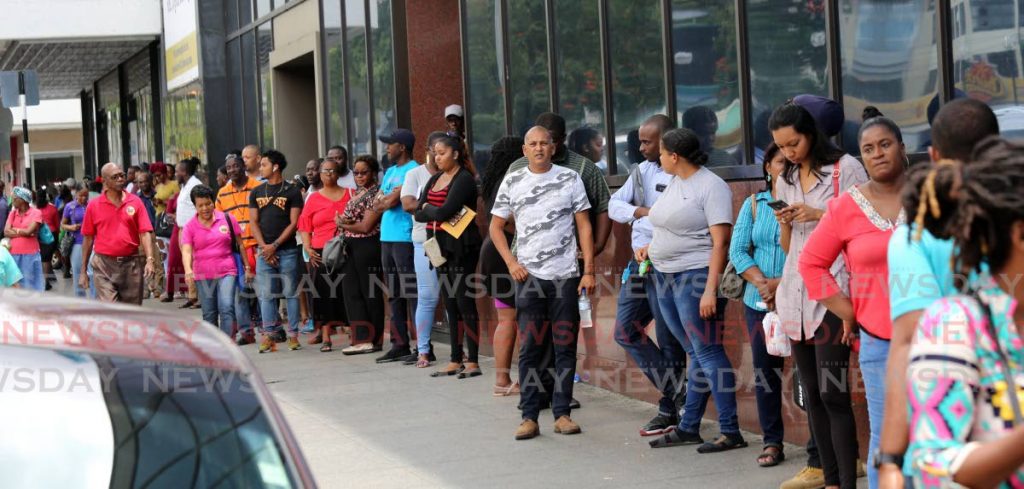QKYC brings customers, banks together

Know your customer (KYC) procedures are the bane of anyone trying to open any kind of bank account – and probably for the banks themselves as well.
Kesha Julien and her business partner Louis Kinley want to make that process easier. They’re the co-founders of QKYC, a firm that helps streamline the KYC process for banks and customers, collating the required personal data securely and efficiently to reduce the time needed to confirm and clarify information. Ideally, the aim will be to not only speed up the time it takes to open a bank account, but also incorporate more people into the banking sector.
“Originally, back in 2017 when we started, we were going to focus on payments because Kesha realised as an entrepreneur, it was hard for a small business, even a successful and growing one, to set up sales online. But as we started going down the road, we realised payments wasn’t just a tech problem or even a Trinidad problem but a global financial system problem. And a big part of that pain was KYC and customer due diligence in general,” Kinley said.
Kinley, originally from the US but now living in TT, was also stunned by the difference in KYC requirements in TT versus his hometown of New York.
“When we started, we both really grounded around the mission of empowering people to be a part of the digital economy. We thought payments would be the way to do that, but then we realised a big part of what is holding people back is access to existing financial services,” he said.

KYC is standard in the global financial system as a way for financial institutions to ensure a legitimate source of funds and prevent money laundering or terrorist financing (AML/CFT). Yet, the way it is implemented differs vastly across borders. For one thing, in the US, all that’s needed to open a bank account is a valid form of ID and an address. In TT, you need at least two forms of ID, a job letter stating at least six months’ employment plus a recent pay slip, and a utility bill as proof of address. If you don’t have these things, the process gets more complicated.
“There are already things in place to facilitate payments. But for a lot of folks, the hassle of collecting other things and going and spending multiple days in the bank is maybe more than they can handle or more than they're prepared to do. And so, we really just saw that as the bigger hurdle,” he added.
QKYC works with some of the bigger institutions in the region (but for privacy reasons, couldn’t share client names). This is because larger institutions often have a greater reach and therefore can affect more people. The company provides tools that can help improve services and seize opportunities for growth through optimisation. “We obviously can't do anything about the regulations, but we can help people make the most of the existing regulations and, you know, really optimise what's there,” Kinley said. “We provide a digital platform for people to do KYC. So, you no longer have to physically go into a location, you can do everything through your computer, smartphone or tablet.”
At the core of it, a lot of the technology is based on open source, Kinley said, which means it’s freely available. “We've taken it and woven it together to actually make a cohesive platform. All the work on that has been done by folks right here in Trinidad. Everybody on the team actually, besides me, is Trini. I have been fortunate to find some really great engineers here,” he said.
Ushering e-IDs
KYC compliance can naturally pave the way for another new and integral consideration: unique e-identification.
“There’s (a study) from the World Economic Forum released in 2016, speaking to the fact that financial institutions and firms are really well-positioned to create and support digital identity systems because they already have robust procedures in place to verify identity.
“When we first started (people wouldn’t want to even hear) when we talked about blockchain (a type of open-source technology used to ensure data remains secure). But when we started researching some more, we found international standards for how digital IDs are actually created and shared and made interoperable. So, when we create the data through the KYC process, that can actually be given to the consumer as a digital ID that they can hold and use to verify with other transactions,” Kinley said.
He did note, though, that while there is interest, people, even in the banking and finance sector, still seemed like they needed some time to adjust and embrace the new technology.
Julien added that this kind of technology could really spur growth and development in TT. “There are people who are completely excited about getting on board and creating digital identities for their customers. And then there are some who are a little bit more hesitant because they don't want necessarily to be the ones to adopt the first risk to be the first risk-takers. They more prefer to see it live and in action before they jump on board. But we do see a great interest in people wanting to be part of a digital identity system – and we are looking to expand into the Caribbean as well.”
Trust is, of course, something that has to be gained when introducing new technology. “This is why we deal with (big) businesses because those businesses will already have a trust relationship with their clients. And by introducing new technology to these businesses, we see that people are more willing to use it than to take it from a company that they have not had previous dealings with. So that's where we're seeing more of that happening, especially around customers who are a bit more risk-averse regards to new technologies,” she added. “Trust but verify,” said Kinley. “So, we've gone through great lengths to make sure that the technology behind it is actually secure. And right now, we're in the process of having that audited to international standards to get certified regarding confidentiality and privacy of all the data that we process and hold. We don't want people to just take our word for it, right?”


Comments
"QKYC brings customers, banks together"